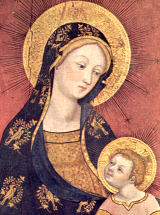Catholic Activity: Christmas at Home and in the Liturgy

Customs and Practices Christmas in the domestic church is best observed by attendance at Midnight Mass, “an event of major liturgical significance.” (Directory on Popular Piety and the Liturgy, #111) If that is not possible, the family may prepare for the feast by praying the Office of Readings before the crib on Christmas Eve. The crib and its Infant-occupant will provide daily food for meditation on the simplicity and poverty, the humility and obedience of our Savior.
The Church encourages families to attend daily Mass and pray some hours of the Liturgy of the Hours every day during the Christmas Octave. Especially on the Feast of the Holy Family, the members of the family should try to attend Mass together and there renew both their marriage vows and the family’s entrustment to the patronage of the Holy Family.
The tree in the domestic church will remain decorated and lighted throughout Christmastide, or at least through the feast of Epiphany. Under the tree, the gifts—reminders of Christ the Gift of God’s infinite love— will include some gifts for the poor, because the “poor belong to every family” (Directory on Popular Piety and the Liturgy, #109), and because the Son of God “who was rich…became poor for your sake.” (2 Cor 8:9)
Many pious exercises are associated with the eve of the New Year, in Europe called simply St. Sylvester. Coming at the end of the civil year it affords the faithful an opportunity to reflect on how swiftly time passes, to do penance for sins committed during the year, and to give thanks to God for the myriad graces and blessing of the past year. The family might participate in a parish prayer vigil that concludes with Mass, or if that is not possible, a vigil could be held in the home before the crib.
In many cultures, Epiphany is the day on which gifts are exchanged, and homes are blessed and sprinkled with “Epiphany water”. On this feast, the Infant-King in his crib will wear a crown and a scarlet robe while Caspar, Melchoir and Balthasar inscribe their initials above the doorways of the domestic church. May it become “a shelter of health, chastity, self-conquest, humility, charity, mildness, obedience to the Commandments, and thanksgiving to God, Father, Son and Holy Spirit. Amen” (Christmas to Candlemas in a Catholic Home, Epiphany blessing)
DIRECTIONS
Focus on the Liturgy
Christmastide extends from First Vespers on Christmas Eve to the Baptism of Our Lord, which usually falls on the Sunday after Epiphany. The mystery of the Incarnate God is one so marvelous that Holy Mother Church celebrates it for eight days, each day of the Octave being considered a “little Christmas”.
For the Eucharistic Liturgy, the Church is exultant in her finest vestments of white or gold vestments, making use of incense, as well as extra flowers and candles to underscore the festal observance of the Lord’s Nativity. The Gloria – that Christmas hymn of the angels—is sung once again. With uncontainable joy the faithful raise their voices in numerous carols; and with humble gratitude, they bend their knees during the Creed at the mention of the Incarnation.
There are four different Masses on Christmas—the Vigil Mass, Masses at Midnight, dawn and during the day – each with its own distinct Propers and Readings. The message of all the Readings is the same: ‘Today is born for us a Savior, God-with-us, the Light that the darkness cannot overcome.’ Only at the Midnight Mass, however, will the faithful hear chanted the Proclamation of the Birth of Our Savior according to the Roman Martyrology.
It is fitting that the Christmas Octave closes and the civil year begins with the celebration of the Solemnity of the Blessed Virgin Mary under her most exalted title—the Mother of God. Other feasts celebrated within the Octave include: the feast of the Holy Family, the feasts of St. John the Apostle, the Holy Innocents and St. Sylvester, and, in vestments of red, the feasts of the martyrs St. Stephen and St. Thomas Becket.
The magnificent feast of Epiphany is celebrated with the same degree of solemnity as Christmas. However, the Feast is not a repetition of the Christmas mystery, but rather the manifestation of Christ, the light to the nations. On this feast the Church proclaims the date of Easter thereby connecting and orientating all feasts to the greatest Christian Solemnity.
With the feast of the Baptism of the Lord (Theophany) (January 9) the season of Christmastide comes to a close.






